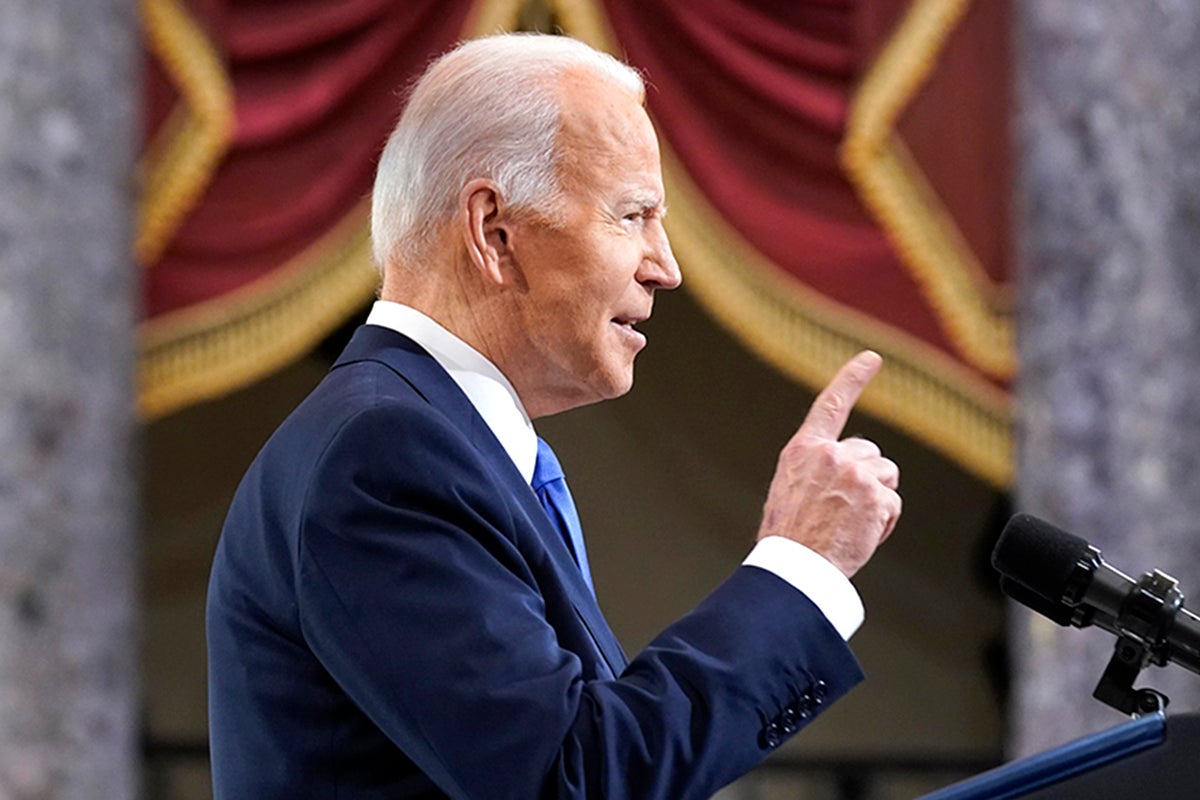How Republicans plan to use 6 Jan ‘denialism’ to win midterms and elect Donald Trump again
Year after 6 Jan many fear democracy more threatened than ever as GOP buys into ex-president’s lies, writes Andrew Buncombe


There was a moment when it seemed the Republican Party was finally going to confront Donald Trump.
The most senior Republican in the House of Representatives, Kevin McCarthy, who had telephoned Trump as rioters laid siege to the Capitol, urging him to call them off, placed the blame at his feet.
“The president bears responsibility for Wednesday’s attack on Congress by mob rioters,” McCarthy declared. “He should have immediately denounced the mob when he saw what was unfolding. These facts require immediate action by President Trump.”
Senate minority leader Mitch McConnell said the angry crowds had been “fed lies”. “They were provoked by the president and other powerful people, and they tried to use fear and violence to stop a specific proceeding of the first branch of the federal government, which they did not like.”
Another senior Republican, Lindsay Graham, said he was done with Trump. “Count me out.”
We now know how brief that confrontation was, more fleeting even than the short-lived moment of glory enjoyed by Washington DC’s cherry blossoms that turn pink in spring and delight both locals and visitors to the nation’s capital.
When Democrats sought to impeach Trump for a second time, charging him with inciting insurrection for a speech he gave to supporters on the morning of 6 January urging them to “fight like hell”, all but a dozen of Republicans voted to support the president.
Just days after his defiance from the floor of the House, McCarthy had flown to Trump’s Florida home, seeking to placate a reportedly furious defeated president. They posed for a picture, Trump grinning manically and McCarthy staring into the camera as if he were a hostage.
Yet, if the image taken that day against the gilt and golden backdrop of Mar-a-Lago were a proof of life photograph of the Republican Party, it was very much Donald Trump’s Republican Party.
As the former president denounced the likes of Liz Cheney and others who had voted to impeach him as a “bitter, horrible human being” and vowed to fund primary challenges against them, McCarthy was putting his name to a joint statement. It said Trump had “agreed to work with Leader McCarthy on helping the Republican Party to become a majority in the House”.
A year after the 6 January storming of the US Capitol, an incident that left five people dead, including a police officer who tried to protect legislators, Trump’s dominance on the Republican Party appears as strong as ever.

It is not simply that an overwhelming majority of Americans who identify as Republican would prefer him to be the presidential candidate in 2024 – a recent a Reuters/Ipsos poll put Trump on 54, a full 43 points over the second pick, Florida governor Ron DeSantis – but Trump is already shaping the nature of the contest Republicans will fight.
At the heart of this, a litmus test of sorts, is a willingness to accept Trump’s continued false claim that the 2020 election was rigged, the “big lie” denounced by Cheney that saw her booted from her job as the third-ranking Republican in the House.
The impact of Trump’s continued rhetoric is clear in this most fact: more than a third of Americans, including 70 per cent of Republicans, do not believe Joe Biden is the legitimate president.
Those who continue to reject Biden’s legitimacy include the likes of Republican congressman and minority whip Steve Scalise, who was grievously injured in a politically-motivated targeted shooting in the summer of 2017.
As recently as October 2021, in a Fox News interview, Scalise refused, repeatedly, to say the election was not stolen, as Trump claims it was.
The message was very clear: if a Republican candidate wants the endorsement of Trump, and the backing of his supporters and fund-raising boost that goes with it, they need to stick to his narrative of a stolen election and that insistence that the current occupant of the Oval Office reached their improperly.
That includes means rejecting and denouncing efforts by Democrats and a small number of Republicans seeking to investigate 6 Jan and its causes.

Joe Biden of course, knows better than most the dangers of his perceived illegitimacy.
“The Bible tells us that we shall know the truth and the truth shall make us free. We shall know the truth. Well, here is the God’s truth about January 6 2021 … rioters rampaging waving for the first time inside this Capitol the Confederate flag that symbolises the cause to destroy America, to rip us apart,” Biden said in a speech on Thursday. “Even during the Civil War that never, ever happened. But it happened here in 2021.”
It is not only at a federal level that Trump’s and his supporters are active. In states and counties, a wholesale effort is underway to elect officials who support the former president and are willing to back measures that would make a win for him easier.
Last year, Republicans passed more than 30 new laws in 17 states to change the rules of election administration, stripping oversight from election officials to put it into the hands of GOP-controlled legislatures. Republican legislators in 19 states also passed laws restricting ballot access, measures that historically have penalised poor and minority voters, who might be more likely to vote Democrat.
More measures are on their way this year. At least 12 bills have been filed ahead of the 2022 legislative session in four states.
Heidi Beirich, co-founder of the Global Project against Hate and Extremism, a non-profit based in Alabama, says the US has been experiencing a rise in right wing thought for some time, and it needs to be taken seriously
“But in the wake of January 6, I am far more concerned about what’s happened to the Republican Party. It has become radicalised,” she tells The Independent.
“Three-quarters of Republicans don’t believe Trump lost in 2020, a third believe in the QAnon conspiracy theory. And there is widespread January 6 denialism. It was just a few months past January 6, before the narrative among conservatives began shifting to the claim that January 6 was just some tourists who were there, or it was Antifa. All these lies about what happened, to minimise the events of January 6.”
While Trump’s continues to insist the election was rigged in the same strident tone he always did, the denialism over 6 Jan often takes a more sophisticated tone.
Tucker Carlson, of Fox News, who is the most watched cable host in the nation, recently produced a three-part series of programmes, Patriot Purge, released on the network’s streaming service Fox Nation, considered to be more right wing that even Fox News. In the series, Carlson suggests those involved in the storming of the Capitol were not Trump supporters, but rather his enemies, including violent leftist Antifa groups and even the FBI.
“January 6 is being used as a pretext to strip millions of Americans, disfavoured Americans, of their core constitutional rights,” Carlson says in the first episode.
The slick Carlson recently told a meeting of young conservatives at an event hosted by Turning Point America, that many of the 750 or more people arrested and charged over the riot, had “merely walked down the hall” of the US Capitol building.
Marjorie Taylor Greene of Georgia, repeated the same conspiracy theory to the same gathering, saying: “The Democrats call it an insurrection, but I think we can start calling it a Fed-surrection.”
Christina Greer a professor of political science at Fordham University in New York, says the denialism often takes on white supremacist overtones.
“Donald Trump has said time and time again the insurrection wasn’t January 6, it was November 3, when the election was stolen from him. So you keep repeating it, you have news organisations repeating it. And then people feel as though they have to ‘take their country back’,” she says.
“That has a real white nationalist, white supremacist element to it. They’re taking it back not just from Joe Biden, but from people of colour, from immigrants, from women. The list goes on and on of those people who they fundamentally believe are not rightful citizens.”

Meanwhile, experts in communications and propaganda say a problem in viewing Jan 6 is that there is no agreed reality about what happened.
The media, with much of its funding dependent on viral moments and engagement, struggles to separate news from entertainment, says Amanda Rogers, a fellow at The Century Foundation. She has written that without a reimagining of the media as an enterprise “far more valuable to civil society than a profitable industry like any other”, repetitions of 6 January will continue.
Speaking from Georgia, she says: “A big part of the perfect storm that was January 6 and the sh*t show that we’re in now, has been coming for a very long time. And unless this country reckons with its history across the board, I don’t think that we will have consensus reality.”
As it stands, the Republican playbook appears to be working. Biden’s approval rating is at an historic low, something experts attribute partly to his inability to halt the pandemic and reopen the economy.
And given the first midterms after a presidential election tend to see more support for the party that lost, many experts believe Republicans will retake the House, and possibly the Senate.
What then might Republicans do?
Ted Cruz of Texas has talked about seeking the impeachment of Biden over this purported failure to stop immigration at the US’s southern border, though he also admitted the GOP would feel pressure to take such a step “whether it’s justified or not”.
Florida congressman Matt Gaetz, another Trump loyalist, has talked having the former president winning an easy congressional seat and making him Speaker of the House, just to see the look on Nancy Pelosi’s face.
Addressing the same influential young conservative audience that Carlson and Greene spoke to recently, he said: “That’s how I pitched it to him. I said ‘Mr President, you only have to be Speaker for like 20 minutes. You take the gavel, and imagine the speech you would deliver as she has to watch with that sour look on her face’.”
He added: “We’ve got to start treating them like they treat us.”
Join our commenting forum
Join thought-provoking conversations, follow other Independent readers and see their replies
Comments
Bookmark popover
Removed from bookmarks